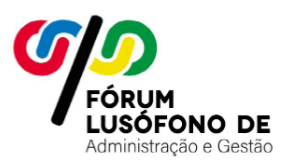January – March 2022 Edition | Volume 2, Issue 1
The initiative is a partnership between ANPAD – Brazilian Academy of Management, ISCSP ULisboa, and the Lusophone Forum for Administration and Management
 The IX Public Administration Conference (EnAPG 2022) will take place from May 30 to June 1, 2022. This edition of the conference will occur together with the VI Lusophone Congress of Human Resources Management and Public Administration in an innovative partnership to strengthen ties between public administration communities in Brazil and Portuguese-speaking countries. The conferences will be co-hosted by the ANPAD Academic Division of Public Administration (APB), the Institute of Social and Political Sciences (ISCSP) of the University of Lisboa (ULisboa), and the Lusophone Forum on Administration and Management.
The IX Public Administration Conference (EnAPG 2022) will take place from May 30 to June 1, 2022. This edition of the conference will occur together with the VI Lusophone Congress of Human Resources Management and Public Administration in an innovative partnership to strengthen ties between public administration communities in Brazil and Portuguese-speaking countries. The conferences will be co-hosted by the ANPAD Academic Division of Public Administration (APB), the Institute of Social and Political Sciences (ISCSP) of the University of Lisboa (ULisboa), and the Lusophone Forum on Administration and Management.
The partnership is unprecedented, but both conferences have been held in different countries for many years. The EnAPG aims to debate and deepen various topics in public administration to update the discussions both academically and in their practices. It is a space where researchers and public agents with different experiences have the opportunity to exchange knowledge and discuss, gathering those who are students to senior practitioners and scholars
The interest groups addressed in the EnAPG 2022 include: relations between state and civil society; state, organizations, and public management: reforms and modernization; public administration, participation, and democracy: perspectives from the state and public governance; government planning, public finance, and control in the public sector; management of public organizations: managerial functions and functional areas; public service organizations and management; cases and applications of public policies: tradition of policy orientation; federalism and intergovernmental relations in Brazil; local governments in Brazil: challenges and municipal perspectives of autonomy and decentralization; regional development, social capital, and local public management; analysis of public policy and inequalities; public administration, public policies, and race relations in Brazil; stakeholders in public administration; innovation in the public sector; entrepreneurship in the public sector; theoretical andempirical interfaces between public management and social management; ontologies, epistemologies, theories, and methodologies in public administration; history, memory, and comparative studies in public administration; Brazilian political administration: thought and practices; state, global governance, and supranational organizations: management and public policies at the international level. Finally, the VI Lusophone Congress of Human Resources Management and Public Administration is included as an interest group of the EnAPG 2022.
 The Lusophone Forum on Administration and Management aims to bring together scholars and practitioners fromPortuguese-speaking countries to discuss issues related to administration and management, forming networks of research and knowledge and practices exchange. The Forum also contributes to the design and implementation of public policies that improve the quality of administration and management in Portuguese-speaking countries. According to Sónia P. Gonçalves, deputy coordinator of the Human Resources Management and Policies Coordination Unit at ISCSP-Ulisboa and executive coordinator of the Lusophone Congress on Human Resources Management and Public Administration, “The Forum has brought together the Portuguese-speaking community of researchers and practitioners in administration and management and promoted a space for discussion aimed at building a Portuguese-speaking style of administration and management, respecting cultural differences and creating synergy between similarities, as well as contributing to the public policies associated with the topic in Portuguese-speaking countries.”
The Lusophone Forum on Administration and Management aims to bring together scholars and practitioners fromPortuguese-speaking countries to discuss issues related to administration and management, forming networks of research and knowledge and practices exchange. The Forum also contributes to the design and implementation of public policies that improve the quality of administration and management in Portuguese-speaking countries. According to Sónia P. Gonçalves, deputy coordinator of the Human Resources Management and Policies Coordination Unit at ISCSP-Ulisboa and executive coordinator of the Lusophone Congress on Human Resources Management and Public Administration, “The Forum has brought together the Portuguese-speaking community of researchers and practitioners in administration and management and promoted a space for discussion aimed at building a Portuguese-speaking style of administration and management, respecting cultural differences and creating synergy between similarities, as well as contributing to the public policies associated with the topic in Portuguese-speaking countries.”
For Gonçalves, the Lusophone Congress of Human Resources Management and Public Administration was one of the ways the Forum found to continue its mission of discussing various aspects and perspectives of administration and management that potentially stimulate the development of people and organizations. Thus, it has fostered research on human resources management and public administration in Portuguese-speaking countries.
Some interest groups have been highlighted in the discussions promoted in the context of the Lusophone Congress, such as organizational behavior; decentralization, mobility, and spatial planning; entrepreneurship and innovation; aging: challenges and opportunities for people management; human resources management in the public service; governance and public health policies; public governance and administrative reform; digital governance; leadership and governance; human resources development policies; innovation policies in public administration; and health and well-being at work.
As for the previous Lusophone Congresses, the first was held in 2011 at ISCSP in Lisbon (Portugal), the second in Sete Lagoas (Brazil), the third in Maputo (Mozambique), the fourth in São Paulo (Brazil), and the fifth in Lisbon. This year, it will be hosted in Brazil. However, the activities will occur online, a format that undoubtedly offers more opportunities to gather Portuguese-speaking researchers who will debate 21 interest groups related to public administration and human resources management.
For Armindo Teodósio, Chair of the APB Division, “the approach and partnership with the Lusophone Congress and the entire community of fellow Portuguese-speaking researchers represent the deepening of the internationalization of research on public administration in Brazil, on new bases and horizontal principles. It reviews a historical trajectory and ties of belonging that brings us closer to the Portuguese-speaking community while encouraging us to think about approximations and distances between public management in these countries. It is a promising partnership and one that is expected to last.”
João Ricardo Catarino, the coordinator of the Department of Public Administration at the partner institution ISCSP-ULisboa, considers this conference to be of the utmost importance not only for the internationalization of the research activities of all professors and organizations involved. It also connects research perspectives adopted among the nations forming the Community of Portuguese-speaking countries (CPLP). On the other hand, he argues that the Congress brings together researchers from all parts of the world and, therefore, can enhance contacts and strengthen networks and partnerships to increase scientific production. It also allows for sharing experiences, practical cases, reform movements, and other solutions adopted in different countries, considering the similarity of public administration models implemented.
The expectation of Fernanda Nogueira, coordinator of the Human Resources Management and Policies Coordination Unit at ISCSP-ULisboa and one of the founders of the Forum, is that the partnership formed this year will make it possible to enhance the vectors of administration and management in the public and private domains and in political, economic, scientific, social, and cultural contexts. In her view, other initiatives can further intensify ANPAD’s partnership with the Lusophone Forum, such as actions to raise awareness of society and organizations in CPLP countries regarding the importance of administration and management and the role of entities that plan, execute, and study policies administration and management; studies on administration and management, with particular emphasis on those that strategically respect the CPLP countries; exchange of information, methodologies, and connection in the study of administration and management issues that are important for CPLP countries; and organization of seminars, conferences, workshops and other actions of study, dissemination, and knowledge sharing on administration and management matters.
For Sónia P. Gonçalves, “the Lusophone Congress on Human Resources Managementand Public Administration will continue to be one of the crucial tools as an embryo space for synergies for Lusophone projects.” The future perspective is that the partnership between the IX Public Administration Conference (EnAPG 2022) and the VI Lusophone Congress of Human Resources Management and Public Administration maintains a channel of scientific communication and performance practices among all Portuguese-speaking countries.
Alketa Peci, president of ANPAD, points in the same direction: “the partnership allows fostering diverse debate forums, stimulating the creation of international research networks, and promoting collaborative research agendas addressing themes of interest for the Brazilian and Lusophone community.”
Suylan Midlej is an Adjunct Professor at the Department of Public Policy Management at the Faculty of Economics, Administration, Accounting, and Public Policy Management at the University of Brasília (GPP/FACE/UnB); Professor of the Graduate Program in Administration (PPGA/UnB) and the Professional Master’s in Public Administration (MPA/UnB); Member of the Scientific Committee of the Public Administration Division (APB) of ANPAD; and Leader of the research group State and Society in the Fight Against Corruption (GESOCC). Sónia P. Gonçalvesis Assistant Coordinator of the Human Resources Management and Policies Coordination Unit at the ISCSP of the ULisboa; Researcher at the Center for Administration and Public Policies (CAPP/ISCSP-ULisboa); and Executive Coordinator of the Lusophone Congress on Human Resources Management and Public Administration


